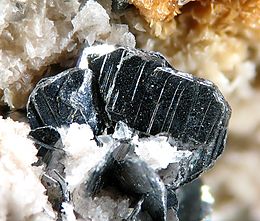Nagyágite
Appearance
| Nagyágite | |
|---|---|
 Nagyágite from Nagyág (Săcărâmb), Romania (image width: 1.5 mm) | |
| General | |
| Category | Sulfosalt mineral |
| Formula (repeating unit) | Pb 5Au(Te,Sb)} 4S (5–8)[1] or AuPb(Sb,Bi)Te (2–3)S 6[2] or (Te,Au)Pb(Pb,Sb)S2[3] |
| IMA symbol | Ngy[4] |
| Strunz classification | 2.HB.20a |
| Dana classification | 02.11.10.01 |
| Crystal system | Monoclinic |
| Crystal class | Prismatic (2/m) (same H-M symbol) |
| Space group | P21/m |
| Identification | |
| Colour | Blackish lead-grey; pale grey in polished section |
| Crystal habit | Tabular crystals (often bent), also massive granular, pseudotetragonal |
| Twinning | Crossed twin lamellae observed on (001) sections |
| Cleavage | Perfect on {010}, excellent on {101} |
| Fracture | Hackly |
| Tenacity | Flexible, slightly malleable |
| Mohs scale hardness | 1.5 |
| Lustre | Metallic, bright on fresh cleavage |
| Streak | Blackish lead-grey |
| Diaphaneity | Opaque |
| Specific gravity | 7.35–7.49 |
| Pleochroism | Weak |
| References | [1][2][3] |
Nagyágite (Pb
5Au(Te,Sb)
4S
(5–8)) is a rare sulfide mineral with known occurrence associated with gold ores. Nagyágite crystals are opaque, monoclinic and dark grey to black coloured.
It was first described in 1845 for an occurrence at the type locality of the Nagyág mine, Săcărâmb, Hunedoara County, Romania.[1][2]
It occurs in gold–tellurium epithermal hydrothermal veins. Minerals associated with nagyágite include: altaite, petzite, stutzite, sylvanite, tellurantimony, coloradoite, krennerite, native arsenic, native gold, proustite, rhodochrosite, arsenopyrite, sphalerite, tetrahedrite, calaverite, tellurobismuthite, galena and pyrite.[3]
References
[edit]- ^ a b c "Nagyágite". Mindat.org. Retrieved 6 August 2022.
- ^ a b c Barthelmy, David (2014). "Nagyagite Mineral Data". Webmineral.com. Retrieved 6 August 2022.
- ^ a b c Anthony, John W.; Bideaux, Richard A.; Bladh, Kenneth W.; Nichols, Monte C. (2005). "Nagyágite" (PDF). Handbook of Mineralogy. Mineral Data Publishing. Retrieved 6 August 2022.
- ^ Warr, L.N. (2021). "IMA–CNMNC approved mineral symbols". Mineralogical Magazine. 85 (3): 291–320. Bibcode:2021MinM...85..291W. doi:10.1180/mgm.2021.43. S2CID 235729616.
Wikimedia Commons has media related to Nagyágite.
